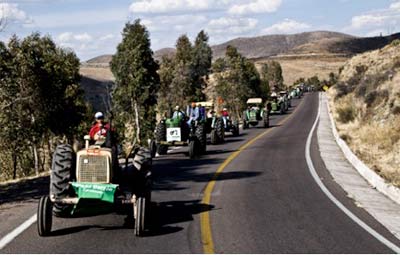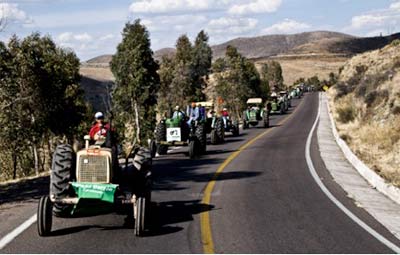
Part of the Series
Harvesting Justice
 The impact of the North American Free Trade Agreement has been devastating to Mexican farmers. In 2008, farmers’ organizations drove their tractors on the route Pancho Villa took during the 1910 revolution, traveling from the U.S. border to Mexico City as part of the “Without corn there is no country” and “The land can’t take anymore” campaigns, demanding support for sustainable food production. (Photo: David Lauer)“Over a half-century ago, Mahatma Gandhi led a multitude of Indians to the sea to make salt in defiance of the British Empire’s monopoly on this resource critical to people’s diet. The action catalyzed the fragmented movement for Indian independence and was the beginning of the end for Britain’s rule over India. The act of ‘making salt’ has since been repeated many times in many forms by people’s movements seeking liberation, justice and sovereignty: César Chávez, Nelson Mandela, and the Zapatistas are just a few of the most prominent examples. Our food movement – one that spans the globe – seeks food sovereignty from the monopolies that dominate our food systems, with the complicity of our governments. We are powerful, creative, committed and diverse. It is our time to make salt.”
The impact of the North American Free Trade Agreement has been devastating to Mexican farmers. In 2008, farmers’ organizations drove their tractors on the route Pancho Villa took during the 1910 revolution, traveling from the U.S. border to Mexico City as part of the “Without corn there is no country” and “The land can’t take anymore” campaigns, demanding support for sustainable food production. (Photo: David Lauer)“Over a half-century ago, Mahatma Gandhi led a multitude of Indians to the sea to make salt in defiance of the British Empire’s monopoly on this resource critical to people’s diet. The action catalyzed the fragmented movement for Indian independence and was the beginning of the end for Britain’s rule over India. The act of ‘making salt’ has since been repeated many times in many forms by people’s movements seeking liberation, justice and sovereignty: César Chávez, Nelson Mandela, and the Zapatistas are just a few of the most prominent examples. Our food movement – one that spans the globe – seeks food sovereignty from the monopolies that dominate our food systems, with the complicity of our governments. We are powerful, creative, committed and diverse. It is our time to make salt.”
So began a statement from the People’s Movement Assembly on Food Sovereignty from the U.S. Social Forum in Detroit in 2010, which launched a national movement. So, too, begins a weekly blog series adapted from Other Worlds’ hot-off-the-press, 140-page book: Harvesting Justice: Transforming Food, Land, and Agriculture Systems in the Americas. The book is the result of five years of interviews and on-site research from throughout the hemisphere, describing strategies to win food justice and food sovereignty. It draws from more than 100 cutting-edge successes, grassroots alternatives, and inspiring models. An appendix offers hundreds of ways to get involved.
From community gardens to just global policy, a national and global movement is growing to reclaim food, land, and agricultural systems from agribusiness and put them back in the hands of citizens. A common thread links innovations and successes happening simultaneously around the globe: a vision of a society that values life and the earth over profit. In the U.S., the parts of the movement have often worked in isolation from each other, but in fact they are all pieces of an inseparable whole. Together, they address:
- The ability of all to eat adequate and healthy food;
- The well-being of the land, air, and waters;
- The fair wages, rights, and health of those who plant, harvest, produce and prepare our food;
- The need to restore and protect small farms and local food systems;
- The ability of Native and traditional peoples to control their own land, grow their own food, and preserve their own cultures;
- The need to privilege the rights and needs of women, as the world’s primary food producers and providers;
- The right of every nation to control its own food and agriculture; and
- An end to corporate control of food and agriculture, including an end to trade rules and international agreements that put profit first.
The group that released the “make salt” manifesto has since formalized itself into the U.S. Food Sovereignty Alliance. A mix of farmers, farm workers, organizers, Native community leaders, Washington policy analysts, and immigrants’ rights advocates, the group brings to the U.S., for the first time, a political demand that has long been seminal in the global South and parts of Europe: food sovereignty. Food sovereignty is a prerequisite for health and justice for all people, food, agriculture, and Mother Earth. It is an expansive set of principles, policies, and practices which ensure the right of everyone to ecologically sound, sustainably produced and harvested food. They also ensure the right of people and nations to democratic control over their food and agriculture systems.
The Nyéléni Declaration, named after a seminal food sovereignty forum in Mali in 1007, articulates the six key attributes of food sovereignty. Excerpted from the original, they are:
1. Focuses on Food for People: Food sovereignty stresses the right to sufficient, healthy and culturally appropriate food for all individuals, peoples and communities. Food sovereignty rejects the proposition that food is just another commodity for international agribusiness.
2. Values Food Providers: Food sovereignty values and supports the contributions of, and respects the rights of, women and men, peasants and small-scale family farmers, pastoralists, artisanal fishers, forest dwellers, indigenous peoples, and agricultural and fisheries workers, who cultivate, grow, harvest and process food.
3. Localizes Food Systems: Food sovereignty puts providers and consumers at the center of decision-making on food issues; protects food providers from the dumping of food and food aid; and resists governance structures, agreements and practices that depend on and promote unsustainable and inequitable international trade and give power to remote and unaccountable corporations.
4. Makes Decisions Locally: Food sovereignty seeks control over and access to territory, land, grazing, water, seeds, livestock and fish populations for local food providers. These resources ought to be used and shared in socially and environmentally sustainable ways that conserve diversity.
5. Builds Knowledge and Skills: Food sovereignty builds on the skills and local knowledge of food providers and their local organizations that conserve, develop and manage localized food production and harvesting systems, and that pass on this wisdom to future generations. Food sovereignty rejects technologies that undermine, threaten or contaminate these, e.g., genetic engineering.
6. Works with Nature: Food sovereignty seeks to heal the planet so that the planet may heal us; and rejects methods that harm ecosystems, and depend on energy-intensive monocultures and other industrialized production methods.
*****************************************************************
Women’s Declaration on Food Sovereignty (excerpted), Nyéléni, Mali, February 27, 2007
“We women from more than 40 countries, from different indigenous peoples of Africa, the Americas, Europe, Asia and Oceania and from different sectors and social movements, have gathered together in Sélingué [Mali] to participate in the creation of a new right: the right to food sovereignty. We reaffirm our will to act to change the capitalist and patriarchal world which puts the interests of the market before the rights of people. Under the watchful eye of Nyéléni, an African woman who defied discriminatory rules, who shone from her creativity and agricultural prowess, we will find the energy to establish our right to food sovereignty, carrier of hope in constructing another world. We will carry this message to women all over the world.”
*****************************************************************
The upcoming blog series shares some of the countless heartening changes that are happening in the movement. You can download Harvesting Justice: Transforming Food, Land, and Agriculture Systems in the Americas from which the blogs were taken, for free at www.harvesting-justice.org. At the end, you’ll find an appendix of organizations that are engaged in exciting work, books that we appreciate, and resources to feed your interest and the needs of your community. Meanwhile, please check back each week to be inspired and gain ideas for turning your commitment into action.
Let’s make salt and make change together.
Download the Harvesting Justice pdf here, and find action items, resources, and a popular education curriculum on the Harvesting Justice website.